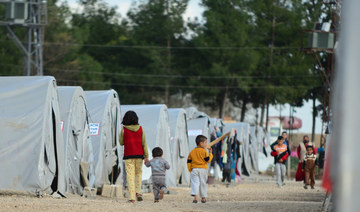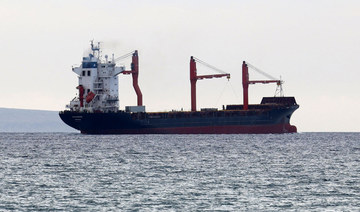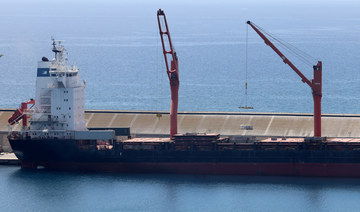LONDON: Ten years after the start of the brutal conflict in Syria, an entire generation of Syrians is missing. Children who grew up during the violence, and fled to safer shores, have told a major charity in a new report that they do not want to return to their country of origin.
In their study titled “Anywhere but Syria,” Save the Children has found that a huge swathe of the refugee children population cannot see themselves returning in the near future.
Between November and December 2020, the charity spoke with over 1,900 Syrian children aged 13 to 17 in Syria (in areas controlled by Bashar Assad’s regime), Turkey, Lebanon, Jordan and the Netherlands.
The results were shocking: Some 79 percent of children said that after two years, they expect to find themselves somewhere other than Syria.

A Syrian child fleeing the war is lifted over border fences to enter Turkish territory illegally, near the Turkish border crossing at Akcakale in Sanliurfa province. (AFP)
Out of the refugee children in the Netherlands and nearby countries, just 14 percent predicted a return to their country of origin. Some 64 percent of the interviewees in these countries were hoping to integrate where they were currently residing.
In Syria, the findings were clear: Children do not want to remain in their country. They were significantly less likely than those in the other countries surveyed to say that they would like to be living in Syria in two years.
Pessimism is rife in Syria, with the children less likely to believe that they will be able to live in the future where they hope to.
Just 42 percent of internally displaced Syrian children said that they thought they would be able to realize their wish, significantly less than those in any other country.

The situation is similarly dire in Lebanon, a country which is hosting approximately 1.5 million Syrian refugees and under enormous pressure from its worst economic recession.
Dr. Nana Ndeda, policy advocacy and communications director at Save the Children’s Lebanon country office, told Arab News: “Lebanon presents a distinct context for Syrian refugees. We are now in a state of affairs where we are extremely worried about the plight of refugees in the midst of an entire population that is going down a steep decline in access to basic services or increased fragility.
“Lebanon is going through its worst economic crisis, we are seeing increased incidents of violence and shortages of food, medicine and other basics. This makes the condition for refugees even worse. In the last couple of weeks, the situation has deteriorated rapidly, with increasing levels of poverty.”
Ndeda added: “Refugees in Lebanon are now twice as poor than they were a year ago. The coronavirus disease pandemic has not made it any easier. There has been more than a year’s disruption in education services, which is leading to an increase of protection challenges, such as child marriage, other abuse, and increasing child labor.
“Most children are using their family hardships as a motivation to get into the workforce earlier than they planned.”
INNUMBERS
Save the Children’s survey
* 26% - Children whose biggest wish is end to violence in Syria.
* 58% - Children inside Syria who reported being discriminated against.
* 29% - Children in Lebanon who want to go back to Syria.
Save the Children reported that freedom of expression and the children having a say in their future was a key theme that was brought up by them in the interviews.
Many of the children interviewed wanted to have their voices heard outside their homes and in society. The team found that children in Lebanon were especially keen to report the value of joint work to positively influence change.
Oben Coban, governmental relations adviser at Save the Children Turkey, told Arab News: “Regardless of the choices of these children, to go back to Syria or stay, we want them to have the security of choosing a safe future. We have a high belief that we do not see a future for children with children having a say in their future.”
As in Lebanon, Turkey has produced its own unique challenges for Syrian refugee children. Coban said: “This 10-year period has been very cruel for these children. They have had to leave their homes and settle in a new culture and country and with a new language.

A decade of war may have ravaged his country, but Syria's President Bashar Assad has clung to power, with help from allies such as Russia's Vladimir Putin, and looks determined to see out the conflict. (AFP/File Photo)
“Turkey is not like Lebanon or Jordan. Here, it is totally different. More than 3.5 million Syrians have fled and integration with the host community has been tough.”
But despite these cultural barriers and language differences, Syrian children have not expressed a keenness to urgently leave Turkey. Oban said that “only three percent of all the children in Turkey want to return, a very low number. Eighty-eight percent want to stay in Turkey. Only nine percent want to go to another country.”
The Turkish experience for Syrian refugees has brought some positives: “Girls are more likely to attend school than many other host countries and the language difference, contrary to our expectations, did not result in children in Turkey feeling ‘othered.’ The most important request from children is that they want to integrate into Turkish society and understand the culture.”
In the Netherlands, in northern Europe and as far from Syrian life as one could imagine, similar results were found, with children expressing a hope to remain in their host country.
Juliette Verhoeven, lobby and advocacy officer at Save the Children Netherlands, told Arab News: “Most of the children perceived being in the Netherlands as something positive in their life. More than 90 percent of the Syrian children in the Netherlands want to stay; some five percent said they would maybe go to another third country. That really stood out.”

Children play in a rainwater puddle at the flooded Mukhayyam Al-Khair camp near the village of Kafr Uruq in the north of Idlib province on December 17, 2020. (AFP/File Photo)
There are some sizable differences between the Netherlands and other host countries that were surveyed regarding the reception of refugees. In Turkey, you cannot be sure if you will get your status as a refugee, and it has to be regularly renewed.
With lingual and cultural barriers, refugees also have to confront Ankara’s inflexible government regulations, which change regularly when it comes to Syrian refugees.
By contrast, Verhoeven said, in the Netherlands “they are never sent back to Syria. It is labelled an unsafe country by the Dutch government, so every refugee gets status unless this person was already registered in another EU country. Once you have refugee status, you have a permit for five years. The chance that you will receive citizenship after five years is highly possible.”
Child refugees from Syria are, in many ways, adjusting to their host countries faster than their parents. Every refugee in the Netherlands is offered the chance to learn a language, but Syria children learn the language much faster than their parents as they grow up around the culture.

Displaced Syrian girl Tayma, 4, sells liquorice juice known as Jallab on the side of the road at a camp near Bab Al-Hawa border crossing with Turkey during Ramadan to help her injured father with living expenses. (AFP/File Photo)
Verhoeven said that this has contributed to “a gap of knowledge between parents and Syrian children, who all indicated that they feel more connected to Dutch society than Syrian society because their parents are at a different pace of the integration process than they are.”
With all of these different experiences in Turkey, Lebanon and the Netherlands, some strands of similar thoughts and feelings are found consistently among Syrian child refugees. At the top of their priorities is the universal desire for the violence to stop.
They are aware, according to the report’s researchers, that their normal lives can never resume until a lasting ceasefire and a political settlement of some kind commences in Syria. But with regular changes in political and military actors in the region, it is unclear when that time may come.
Until it does, Syria’s missing generation is expected to want to remain in the safer, distant homes they are creating.
------------------
Twitter: @CDP1882






























